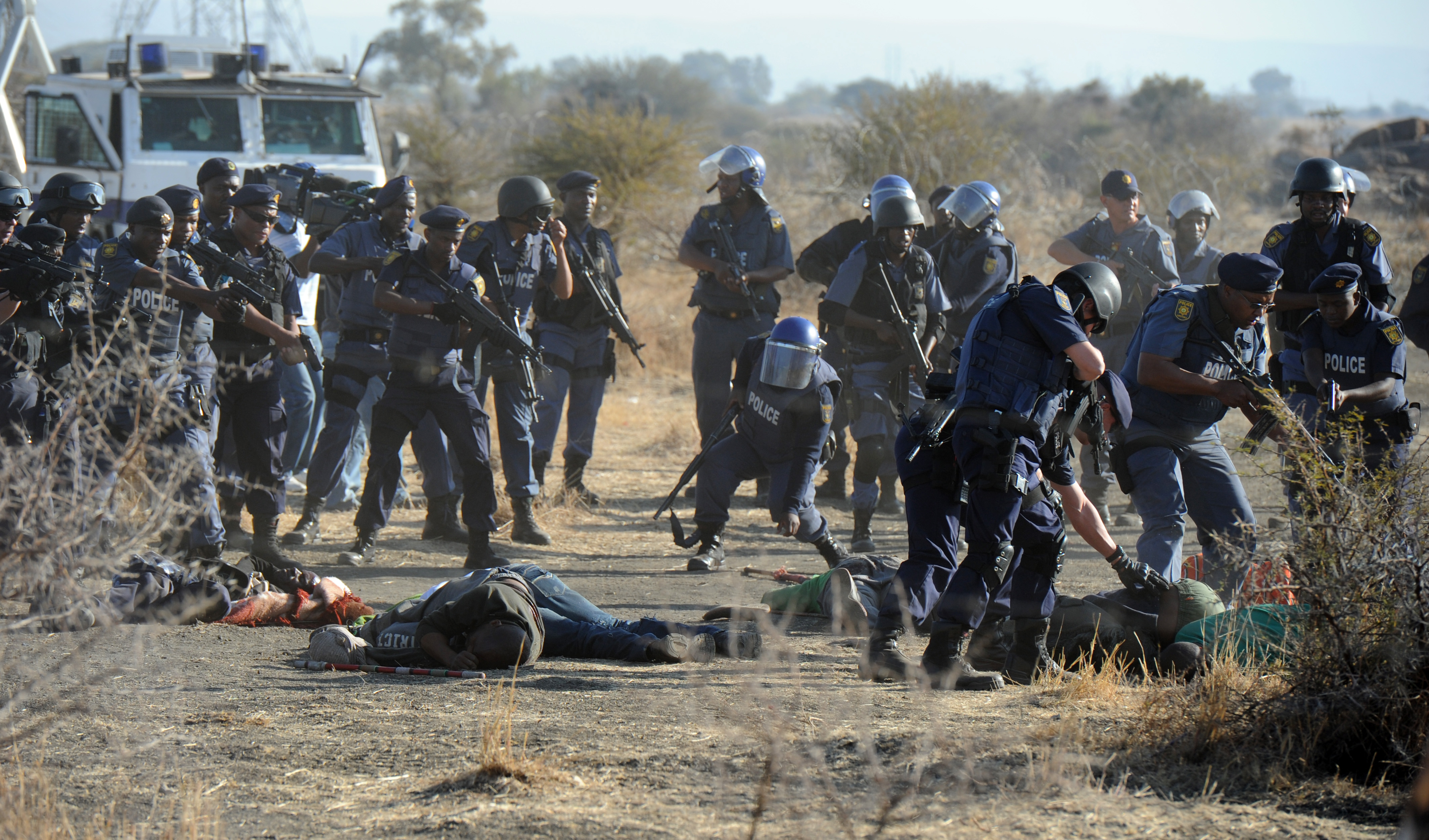The Socio-Economic Rights Institute of South Africa (Seri) said it was “disheartened” by the acquittal of six former and current police officers who were allegedly involved in the deaths of three mine workers and two SAPS members at Marikana in 2012.
On Monday, the six were acquitted by the North West Division of the High Court in Mahikeng for their role in a bloody confrontation on 13 August 2012 which resulted in the deaths of mine workers Semi Jokanisi, Thembelakhe Mati and Pumzile Sokanyile, and SAPS warrant officers Tsietsi Hendrik Monene and Sello Ronnie Lepaauku.
The trial against the six began in May 2021.
Nomzamo Zondo, Seri’s executive director, said: “The failure to hold accountable those responsible for these deaths is a betrayal of justice. Not only does it dishonour the families of the deceased but erodes trust in our justice system.”
Read more: Marikana: 10 years later
13 August 2012
On 13 August 2012, a week before 34 people were shot dead at the Lonmin mine in Marikana by the police, mine workers on strike marched from Lonmin’s Karee shaft towards the K4 shaft in a bid to persuade others to join the strike.
Before they reached the shaft, the mine workers decided to return to a koppie which they had occupied. On their way, they were intercepted by the police, led by former North West Deputy Police Commissioner Major General William Mpembe.
Mpembe tried to negotiate with the mine workers and encouraged them to lay down the traditional weapons many were carrying. The mine workers asked the police to escort them back to the koppie where they would join the rest of their peers who were peacefully protesting.
Mpembe’s team refused to negotiate and the mine workers moved away, continuing their march to the koppie. A tear gas canister was set off by the police, followed by stun grenades without any warning.
The three mine workers and two police officers were killed in the chaos that ensued.
Mpembe was charged in his capacity as the head of the operation for the murder of the five people for instructing police to fire tear gas, stun grenades and rubber bullets, which resulted in the deaths of the mine workers and police officers.
Mpembe was also charged with the attempted murders of six mine workers and one police officer.
For the murder of Sokanyile, he was charged alongside retired Colonel Salmon Johannes Vermaak and police officers Nkosana Mguye, Masilo Mogale, Katlego Joseph Sekgweleya and Khazamola Phillip Makhubela.
Sokanyile died after being shot in the head after he was allegedly pursued by the police, about 620m away from the scene of the main confrontation.
“The police officers who were charged included those who admitted shooting at Mr Sokanyile in testimony before the Marikana Commission of Inquiry and were also connected to cartridges found 74.4 metres away from Mr Sokanyile’s body,” said Seri.
“Despite this, the officers were acquitted.”
No accountability
In the only other trial related to events at Marikana, in March 2021, then SAPS members Mpembe, Gideon van Zyl, Dingaan Madoda and Oupa Pule were acquitted on charges in connection with the death of mine worker Modisaotsile van Wyk Sagalala.
Read more: Six years on, there is no accountability for the elite police unit shootings at Marikana Scene 2
Sagalala was shot twice by the police. The four police officers who were tried testified at the Marikana Commission of Inquiry that he died at the Andrew Saffy Hospital when, in fact, according to an investigation by the Independent Police Investigative Directorate (Ipid), he died in a police vehicle outside a detention centre.
The officers were charged with defeating the ends of justice, contravening the Ipid Act for failure to report a death in police custody and contravening the Commissions Act by lying to the Marikana Commission of Inquiry.
“The state is yet to charge anyone concerning the events of 16 August 2012. The families of the deceased mine workers continue to wait for justice 12 years after the Marikana massacre,” said Seri.
On 16 August, Justice and Constitutional Development Minister Thembi Simelane said, “The government remains steadfast in its commitment to addressing the claims arising from this tragedy. Approximately R352-million has been disbursed in claims related to Marikana.”
Read more: New Justice minister update – Marikana massacre, Guptas and AKA double murder extraditions
Seri, however, said that of 315 claimants, 129 had not received a cent.
On Monday, Seri said, “The state has failed in its duties to uphold the rights of victims to an effective remedy and allowed this gross abuse of human rights to remain unaccounted for, to the detriment of the survivors, the families and at a cost of continued failures in policing.”
Seri is continuing with its twofold fight for accountability for the massacre and a civil suit against the state for compensatory damages. DM





